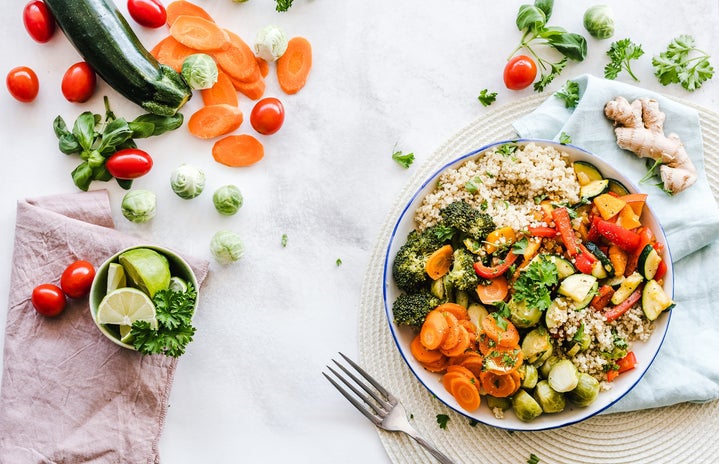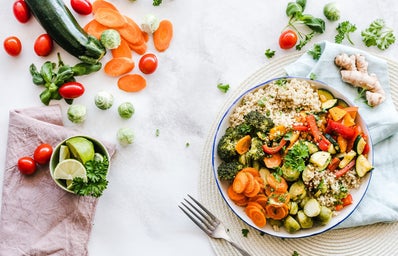Meet Lauren Planas M.S., R.D., L.D.N, Emerson’s new registered dietitian here to help students with all things nutrition including sports nutrition, finding food on campus with dietary restrictions and allergies, disordered eating and general nutrition counseling.
Emerson students often juggle busy schedules. From classes and homework to film shoots and rehearsals, it’s easy for food to take a backseat. But eating is one of those essential things humans need to do to survive, even when we are super busy. To illustrate the importance of adequate fueling, Planas likes to use the image of a fire. “Just like you can’t start a fire without wood, you can’t expect your body to function without enough food,” she says. Your body needs enough fuel to simply stay alive. “Two thirds of our daily energy needs come from ‘under the hood’ processes such as breathing. The other third comes from physical activity,” Planas says. When engaging in any sort of physical activity, the body is going to prioritize energy in the moment. This can become a problem if one consistently is not eating enough. “It’s important to take a step back and recognize the long term consequences of consistent under-eating. You might feel dizzy and lightheaded, people with periods may experience irregularities in their cycle, your reaction time might slow and your mood might fluctuate more frequently,” Planas says. While it might feel like you’re too busy to eat one day, if that happens continuously it can become a problem.
To combat this, it’s important to ensure you are eating from a variety of food groups. Each macronutrient does something different for our bodies. “Carbohydrates are our bodies preferred source of energy, protein and fats help with satiety to keep us full for longer. Fruits and vegetables are filled with micronutrients and fiber to help aid with digestion” Planas says. When building a meal or snack it’s important to try and include at least two of these components to avoid feeling hungry 25 minutes after eating. For meals this could look like a turkey and cheese sandwich with a side salad or a serving of tofu and rice with sauteed veggies. Greek yogurt, nuts, cheese and crackers make great snack options. Planas recommends taking some time to look at your schedule to see when you might have a break and when you might have to eat on the go. “Maybe take a quick trip over to CVS or Roche Bros to get a few things to keep in your dorm that you can take with you or make easily” she says.
Planning ahead is even more important on the weekends when the dining hall has limited options and other campus dining centers are closed. Planas recommends bringing your Green Clamshell container to the dining hall with you to try and save something for later. “It might be something from the salad bar or a hot option that you can eat after a late rehearsal so you don’t have to think about what you’re going to eat at 10 p.m.” she says. The Max also has pre-made sandwiches and other snacks to help supplement what you’re able to find at the dining hall. If you’re having trouble finding options that fit into your dietary needs, Planas urges you to reach out for help. “I’m here to help you meet your nutritional needs. So is the dining hall staff. They want to hear from students and they want to make sure you have enough to eat” Planas says.
When deciding what you’re going to eat before rehearsal it’s important to look at the whole picture and ask yourself, “Have I eaten anything today? Have I eaten enough today?” If you have not eaten enough today you might want to try and eat a more substantial meal about an hour before starting your activity. If you have eaten enough and just need a snack, try and get in something with quick carbs 15-30 minutes before beginning movement. “Before movement activity we want a quick energy source that our body can use immediately that won’t upset our stomach” Planas says. This could be a few handfuls of dry cereal, some pretzels, an applesauce (shoutout to GoGo Squeezes for fueling Emerson Dance Company through our show weekend), or a granola bar. After your activity is when you want to include protein but make sure to also eat a source of carbohydrates to refuel your tank.
With a busy schedule it’s natural to reach for a source of caffeine for a quick jolt of energy but it’s important to keep a few things in mind when it comes to coffee consumption. “Coffee is not a meal. Neither is a celsius nor a cup of tea (or a piece of gum for that matter)” Planas says. “Caffeine gives our bodies a false sense of energy. If you notice yourself relying on caffeine to curb your appetite, that is a red flag that should not be ignored. Caffeinated beverages should not be your only source of hydration either.”
With the diet focused society we live in it can be easy to assign morality to foods. Planas urges you to remember that no food is “good” or “bad.” “There is a lot of misinformation out there, especially on social media sites like Tiktok so it’s important to know that no one food will change your body, it’s all about habits and trends” Planas says.
While it is important to be aware of your eating habits, overanalyzing them may have detrimental effects on your mental health. If you are concerned about your eating habits it doesn’t hurt to make an appointment with Health Services. “I can’t make a blanket statement about when to come see me but if you notice yourself feeling dizzy, losing weight, or are just not feeling good with food you might want to come talk to me.” Planas says.
Every body is different and requires unique nutritional needs. It is important to speak to a professional about your unique needs instead of blindly following an influencer. Your body needs enough fuel to do all of the things you want it to do. Your body deserves food regardless of what you’ve done today.
Lauren Planas is available on Tuesdays, Wednesdays, and Thursday mornings in Health Services.

